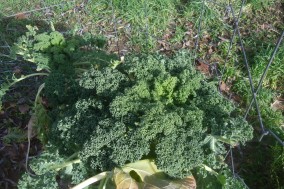Reflections on a hot year
- Article Published At:
- Rutland Herald & Barre-Montpelier Times-Argus
- Date of Publication:
- January 10th, 2016
In January I like to look back on the year that is past. So far the winter has been much warmer than the last two. We have the very strong El Nino in the equatorial Pacific to thank for this. I still have Brussel sprouts to eat from the garden, and fresh fall spinach as well as my spring spinach growing under glass. I have even been thinning spring lettuces for a month now!
This past year 2015 set a new record global temperature by a very large margin, shattering the myth that climate warming was slowing down. Undoubtedly the best news was the December climate agreement in Paris with the consensus support of 196 countries. Nations made commitments to reduce the burning of fossils fuels to try to restabilize the climate system. This is a daunting task, since we have waited so long, but at least we are now heading in the right direction, with clear targets and progress reviews every five years.
Grassroots democratic pressure helped a lot – many Vermonters went to Paris – and the moral clarity of Pope Francis was on the minds of many leaders. Fortunately these activists realize just how much work lies ahead for the rest of this century. Follow-through will be difficult for many leaders, as they slip back into local politics, election cycles and business as usual. Vermont can play a leading role.
So let us start by facing some truths that were necessarily ignored in Paris – in order to get an agreement. One basic issue is that the developed countries dream that climate change can be dealt with within the global market, and the economic, financial and technical framework that has made them rich and powerful. Yet this is the very framework that has accelerated climate change in recent decades. In addition, the necessity of a fossil carbon pollution tax was not even on the table.
The developing countries want to lift their people out of poverty, and their elites think in the same terms of consumer growth, centralized power systems and more cars that have fueled climate change. The rich nations are happy to profit from these expanding markets, and eager to add a lot of renewable energy systems to the mix.
But as Pope Francis said: our increased power has not been linked with deeper moral values, and a true sense of our common home and common destiny. One result is that the exploitation of the Earth and the exploitation of the poor by the wealthy are now intertwined. In Paris, the rich developed countries were reluctant to make agreements to share resources with developing countries. Sharing intellectual property rights on essential renewable technology would reduce their profits. So financial commitments from the rich to the poorer nations were small compared with the scale of the challenge.
Some were surprised at the about-face of China in the past year, but two of the reasons for this are salutary. The air pollution in Chinese cities from burning coal is so unhealthy that urban revolt is brewing. And China has realized that its future economic growth could be based on supplying the world with cheap renewable technologies for decades to come.
Sitting by the fire and dreaming of spring this January, we need also to dream how to transform our ‘buy more’ consumer society and growth economy into something sustainable that the Earth can handle. This will take vision, time and effort.
